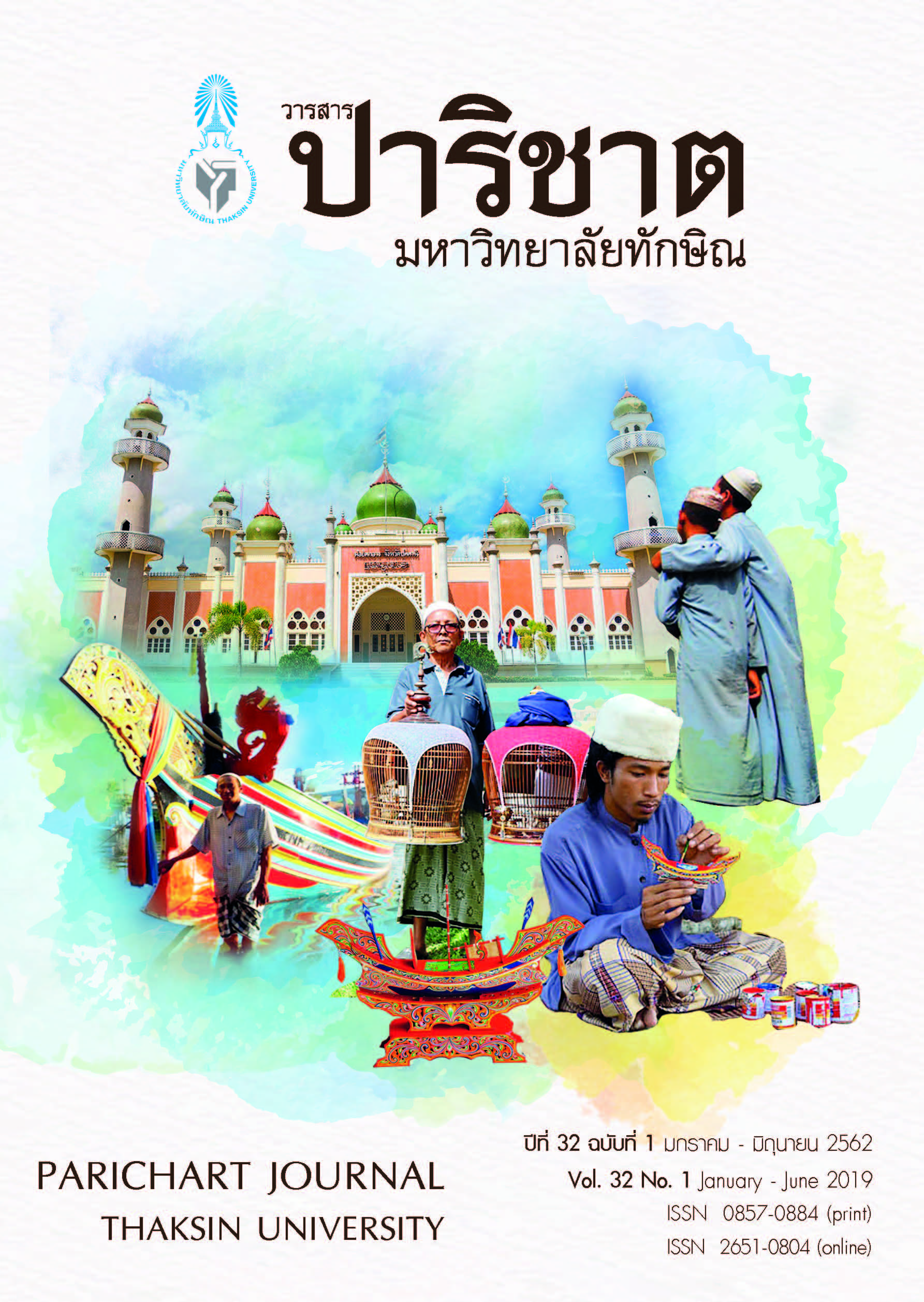The Study of Body of Local Wisdom Knowledge Towards Bee Trapping in the Forests Area of Phrom Khiri District in Nakhon Si Thammarat Province
Main Article Content
Abstract
This research aims to study the folk wisdom of trapping bees in the forests of Phrom Khiri District, Nakhon Si Thammarat. The research was quantitative research.Data was collected by observing and interviewing the samples which are 1 sage villager, 3 sage villagers who are able to trap bees at the present and 7 successors of bee trapping folk wisdom. The research shows that there are still sage villagers who are good at trapping bees. The sage villagers still apply this folk wisdom to trap bees. Moreover, this folk wisdom has been passed on to younger generations. This is the way people adjust their living to the environment under the concepts of folk wisdom, eco-culture and ethnic ecology. Folk wisdom of trapping bees consists of tools or materials used in trapping, process of trapping bees, and the belief or the taboo of trapping bees that people should learn which ones are “ Dos” and which ones are “ Don’ ts” . All of these reflect the importance of this folk wisdom which must be studied, collected, and publicized to create perception, to protect the disappearance and to preserve as the human intellect, experience accumulation, and ability to adjust the living. These bring about the knowledge and know-how to live and become environmentally friendly. The natural resources should not be only used or not be destroyed, but they should also be applied and preserved for their sustainable abundance.
Article Details
References
Sirasuntorn, P. (2007). Practice community in learning: concepts, techniques and processes. Bangkok: V.Print (1991).
Tansupol, A. (2016). Cultural ecology: A key to sustainable development. Journal of Humannities and Social Sciences, 12(1), 193-221
Santasombat, Y. (2 0 0 4 ). Ethnoecology, biological resources and community right. Chiang Mai: Within Design.
Adsakul, S. (2012). Introduction to sociology. Bangkok: V.Print (1991).
Buaneaw, T. (2000). Third age of community development. Trang: Nokchao Publisher.
Dang (Pseudonym). Interview, 20 May 2016.
Dam (Pseudonym). Interview, 20 May 2016.
Somchok (Pseudonym). Interview, 3 April 2016.
Sommai (Pseudonym). Interview, 3 April 2016.
Krainatee, M. (2 0 1 6 ). Photographer. Faculty of Humanities and Social Sciences, Nakhon Si Thammarat Rajabhat University, Nakhon Si Thammarat.
Na Thalang, E. (1997). Folk wisdom of four regions: life style and learning process of Thai villagers. Nonthaburi: Sukhothai Thammathirat Open University Press.
Chanaboon, P. (2010). Knowledge management of mfolk wisdom of hunting tools to catch aquatic animals in Rangkrathum Municipality, Banglane District, Nakhonpathom Province. Independence Study of Master Degree of Public Administration, Local Government Program, College of Local Government, Khon Kaen University.
Buddha, N. et al. ( 2008) . Situation of Thai wildlife: Wildlife trafficking, zoo, and conservation area: The Solutions and research questions. The Thailand Research Fund (TRF).
Culture and Community Sector. (2011). The project of conserving folk wisdom of hunting tools to catch animals. Bodhivijjalaya College.
Chuaybumroong, T. ( 2001) . Wisdom for creative community development. Bangkok: King Prajadhipok's Institute.
Boonpok, D. (2 0 1 6 ). The role of family in transmission of food related folk wisdom: A case study of Central Thai family. Parichart Journal, 29(1), 16-38.
Pongnurak,P et al. (2006). A study of performance by teachers in Songkhla Province as leaders of the conservation and development of local wisdom and Thai Culture. Parichart Journal (Graduate Study), 18(3), 1-7.
Krainatee, M. (2018). Knowledge of folk wisdom in trapping wild animal in the forests of Phrom Khiri District, Nakhon Si Thammarat. Nakabut Paritat Journal, 10(1), 143-153.
Eiamsam-arng, C., & Silatrakool, W. (1991). Folk wisdom, folk technology and science sources in communities. Nonthaburi: Sukhothai Thammathirat Open University Press.
Puang-ngam, K. (2000). Local and community self management. Bangkok: Borpitkarnpim.


